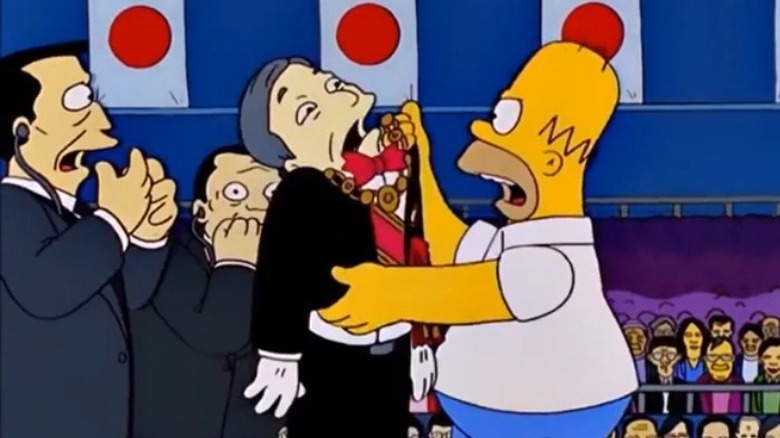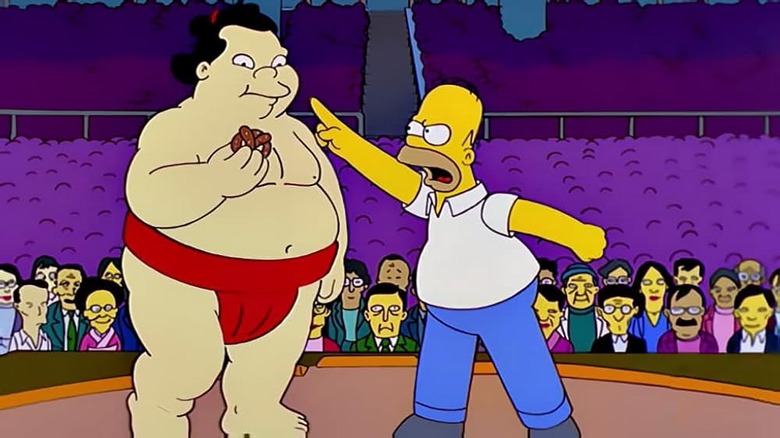One Of The Simpsons' Most Controversial Episodes Was Banned Overseas
In the "The Simpsons" episode "Thirty Minutes Over Tokyo" (May 16, 1999), Homer (Dan Catellaneta) loses his family's vacation money to an online scam. Acting on a tip from his chipper neighbor Ned (Harry Shearer), the Simpsons learn they can get vacations at a discount by claiming abandoned airplane tickets at the airport. By random chance, the Simpsons find themselves on a trip to Japan.
The ensuing shenanigans are predictably hilarious, as the doltish, ultra-American Simpsons find themselves butting heads with various facets of Japanese culture. They are astonished by the country's high-tech toilets, experience seizures watching a local cartoon show (a spoof of the Pokémon episode that caused seizures in children), and attend an ikebana class. Eventually, Homer will go to prison (natch) and the Simpsons will lose all their money (also natch), They will be forced to briefly work in a fish-gutting factory before trying to win plane tickets home on a wild game show called "The Happy Smile Super Challenge Family Wish Show." George Takei played the host. One of the game show challenges is being struck by lightning. The episode ends with the Simpsons flying home, fleeing Godzilla, Mothra, Rodan, and Gamera.
The episode was warmly received by American audiences but caused some controversy in Japan. Notably, there is a scene wherein Homer and Bart (Nancy Cartwright) attend a sumo match, where they run into Emperor Akihito. Homer, having stumbled into the sumo match himself, callously grabs the Emperor and flings him into a box of sumo thongs (perhaps more accurately called mawashi). According to the DVD commentary for "Thirty Minutes," the mistreatment of Akihito got the episode banned in Japan, where it never aired. It's also not available on Japanese Disney+.
All hail Emperor Clobbersaurus!
Emperor Akihito doesn't address himself by name, merely saying "I am the emperor." He does, however, look like Akihito, who sat as Japan's Emperor from 1989 until 2019. Homer, not caring that the Emperor is speaking to him, declares himself to be Emperor Clobbersaurus and flings the respected dignitary as described above.
"Thirty Minutes Over Tokyo" is not the most culturally sensitive episode as is, but to have Homer throw Akihito into a thong receptacle — and possibly kill him — was too much for the Japanese censors. The Japanese government found the scene to be disrespectful, and it was pulled from the air. It's clear that the writers were mocking the way ignorant Americans like the Simpsons view Japan, rather than merely mocking Japan itself, but it was hard for the Japanese government to see the nuance. One might understand why it was banned.
There were rumors circulating that the founder of Sanrio, Yukio Shimizu, hated that her character, Hello Kitty, was also disrespected in the episode, but those rumors are unsubstantiated.
More than anything, "Thirty Minutes Over Tokyo" is certainly guilty of "othering" Japanese culture, the way so many pieces of American tend to. Asian cultures, according to the broad stereotypes, are typically seen to be inscrutable and strange. One can see this phenomenon in effect in films like Sofia Coppola's "Lost in Translation," which has been the subject of many sociological thinkpieces. There were many American films about encroaching Japanese culture in the 1980s as the country's economy boomed and some American businesses began to feel threatened. Ron Howard's "Gung Ho," comes to mind, as does "Black Rain," or even the Tom Selleck comedy "Mr. Baseball."
The sociological essays
Professor Thomas B. Gold of Berkley University famously wrote an entire thesis based on "Thirty Minutes Over Tokyo," using it as an illustration of how pop media is often wielded to communicate cultural biases. He presented his paper as a tale of how cultural objects are exchanged via media and was most concerned with how "The Simpsons" depicted Americans more than it depicted Japanese people.
Ultimately, "The Simpsons" is one of the ultimate works of self-mockery. Made by Americans, the show skewers the lower aspects of American life, depicting the title family as painfully typical of the American experience, which is to say: they are caustic, ignorant, violent, easily led, and tend to stifle creativity and intelligence. The central theme of the series, though, is that the Simpsons still love each other at the end of the day, so it's possible to laugh with them while also laughing at them.
But, just as any piece of media that tries to push the envelope, "The Simpsons" can toe the line a little clumsily. I would personally argue that "Thirty Minutes Over Tokyo" displays a distinct knowledge of Japanese culture, clearly culled from someone who has been there and interacted with Japanese people; it plays into certain stereotypes but isn't there to mock them or reinforce them. But then, I'm not a Japanese person, and might not be in the best position to make that call.
And when Homer Simpson is throwing Emperor Akihito into a bin of sumo thongs, it's easy to see that a line has been crossed somewhere.


